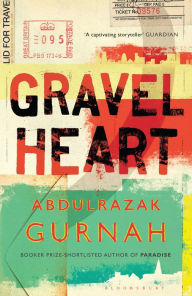
I first came across Abdulrazak Gurnah’s fiction when his 1994 novel Paradise was short-listed for the Booker Prize. And while it’s been many years now since I read it, I remember being impressed by it. So when I saw that he had a new novel coming out this season, I jumped at the chance to get a review copy. (Thanks to Bloomsbury USA for sending me the review copy.) I admit I was secretly hoping to “discover” a new hit before it reached booksellers.
Well, I had the wrong publication date, so the novel’s in fact already for sale, but more importantly, I’m afraid Gravel Heart doesn’t live up to my expectations.
It’s hard to talk about this book without giving away some things, but it’s a novel in which, for the most part, nothing really happens, so I won’t give away too much. And I won’t give away the one small mystery that runs throughout the novel. But if you don’t want to hear any spoilers, better close this here.
The first-person narrative begins by telling us a bit about Salim’s childhood in Zanzibar. The details are a little hazy throughout the first part of the novel, but the important details are that Salim’s parents have split up. There’s a dark secret surrounding why and no one is willing to talk about it. Salim lives with his mother. His father has moved out of the home and lives with friends in the same town for a while, but then moves to Kuala Lumpur with his own father.
In the meantime, Salim is sent to England to attend university, under the patronage of his uncle (his mother’s brother), Amir, who is a condescending, exacting, minor diplomat, and a complete ass most of the time.
My problem with the novel is really that the first two thirds are just plain dull. Salim talks about events that could be heart-wrenching and momentous, but they’re all narrated very matter-of-factly, then within a page or two, Salim moves on to the next relationship, the next hardship, as if the previous one really had no impact upon him.
Then suddenly, two-thirds of the way through the book, Salim goes back home after his mother dies and his father has returned to Zanzibar. For Salim’s entire life, his father has never really spoken. Now suddenly he launches into a monologue that lasts the remaining third of the novel. In it, we get a lot of politics and history of the region, which is only tangentially related to the family story. And then–finally–we get an explanation of the family mystery. It’s the only part of the novel where any passion emerges.
It’s a book about family, but also about self-exile, about being an immigrant to the country that has colonized your own country, about identity. But I really believe the father’s life should have been the subject of the novel; the Salim story is just in the way. It would have been more compelling and readable. But it comes so late in this novel that I had already lost interest, I’m afraid. So, perhaps take a pass on Gravel Heart and pick up Gurnah’s Paradise if you’re interested in giving his work a go.
Well, I had the wrong publication date, so the novel’s in fact already for sale, but more importantly, I’m afraid Gravel Heart doesn’t live up to my expectations.
It’s hard to talk about this book without giving away some things, but it’s a novel in which, for the most part, nothing really happens, so I won’t give away too much. And I won’t give away the one small mystery that runs throughout the novel. But if you don’t want to hear any spoilers, better close this here.
The first-person narrative begins by telling us a bit about Salim’s childhood in Zanzibar. The details are a little hazy throughout the first part of the novel, but the important details are that Salim’s parents have split up. There’s a dark secret surrounding why and no one is willing to talk about it. Salim lives with his mother. His father has moved out of the home and lives with friends in the same town for a while, but then moves to Kuala Lumpur with his own father.
In the meantime, Salim is sent to England to attend university, under the patronage of his uncle (his mother’s brother), Amir, who is a condescending, exacting, minor diplomat, and a complete ass most of the time.
My problem with the novel is really that the first two thirds are just plain dull. Salim talks about events that could be heart-wrenching and momentous, but they’re all narrated very matter-of-factly, then within a page or two, Salim moves on to the next relationship, the next hardship, as if the previous one really had no impact upon him.
Then suddenly, two-thirds of the way through the book, Salim goes back home after his mother dies and his father has returned to Zanzibar. For Salim’s entire life, his father has never really spoken. Now suddenly he launches into a monologue that lasts the remaining third of the novel. In it, we get a lot of politics and history of the region, which is only tangentially related to the family story. And then–finally–we get an explanation of the family mystery. It’s the only part of the novel where any passion emerges.
It’s a book about family, but also about self-exile, about being an immigrant to the country that has colonized your own country, about identity. But I really believe the father’s life should have been the subject of the novel; the Salim story is just in the way. It would have been more compelling and readable. But it comes so late in this novel that I had already lost interest, I’m afraid. So, perhaps take a pass on Gravel Heart and pick up Gurnah’s Paradise if you’re interested in giving his work a go.
 RSS Feed
RSS Feed
